Every enduringly good car has a repeatable formula. If you’ve found it once and remained true to that ethos, you can find it again. At worst, you’ll give the world more of a great thing. The 2023 Honda Civic Type R is more of a great thing, in a wrapper many people will find more agreeable than the previous generation. Which is important, because it was hard to have any conversation about the outgoing Type R without tripping into a conversation about the design. Thank goodness; we can talk about something else now.
Full disclosure: Honda flew me out to Napa, California, put me up in a resort where all the staff wore Canadian tuxedos and gave me a new Civic Type R to drive on the cascading, dewey hills of Sonoma Raceway, where I learned a few sobering lessons on wet-weather driving.
2023 Civic Type R: What Is It?
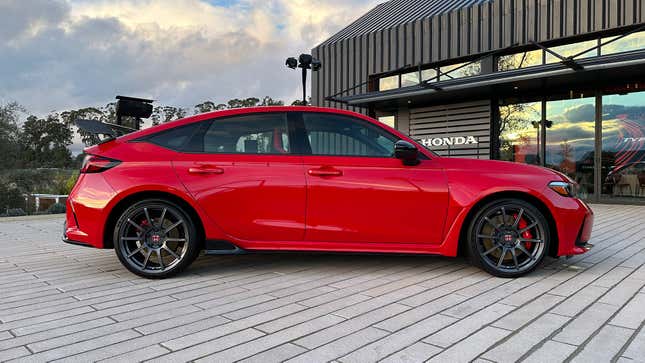
It’s the latest iteration of Honda’s bread-and-butter performance compact, built atop the 11th-generation “FL” Civic five-door hatch. This marks the sixth Civic Type R, but only the second to be officially sold in North America since 2017. It’s arriving to customers now, and comes in just one configuration, priced at $43,990 (including a $1,095 destination charge).
Before we go any further, I’d be remiss not to mention Steve DaSilva’s earlier story about tracking the new Civic Type R over at Texas’ Harris Hill Raceway. He only got a few laps, and due to inclement conditions at Sonoma Raceway on the afternoon of my drive, so did I. However, I did have the opportunity to drive the Type R on the road as well, so I can speak to the car in a more routine context. Spoiler: It’s great there, too!
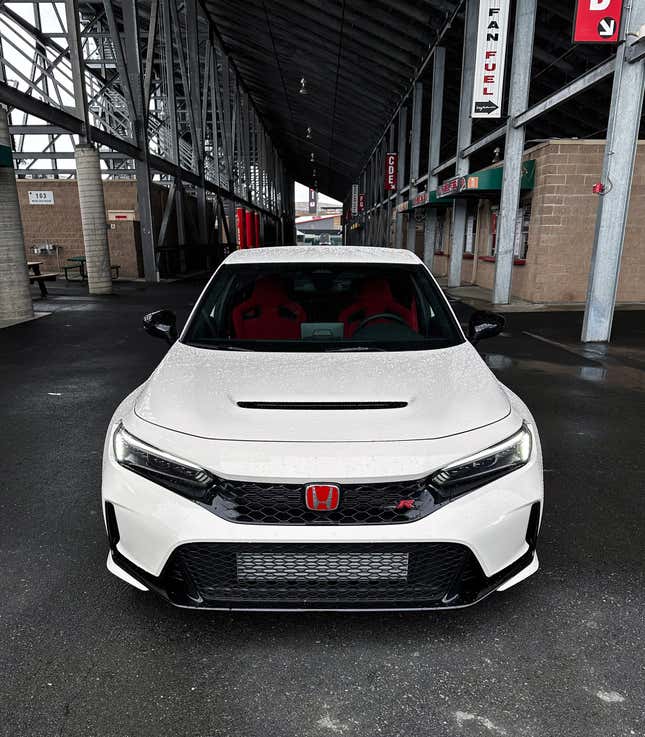
But let’s flip back to the topic of styling, because it’s critical to the FL Type R’s story. Remember the outgoing 10th-generation Civic? The one that looked like it was penned by the kid who brought a Rockstar Energy tallboy to ninth-grade art? Honda will have you know, when the company surveyed buyers of that car about their purchasing considerations, design consistently placed near the top of the list. And I completely believe that. It’s the same reason why BMW can shield itself behind its customers every time it’s criticized for its own quizzical design choices. Plenty of people gravitate toward aggression.
Still, something motivated Honda to tone down the exterior of the new Type R. Count me among the contingent that is pleased to see the Type R dialed back, to stand more in line with Civics of yore. It’s not perfect: the liftgate is so awkwardly rakish that this will never be a hatchback in my eyes, and the front end looks stubby in photos.
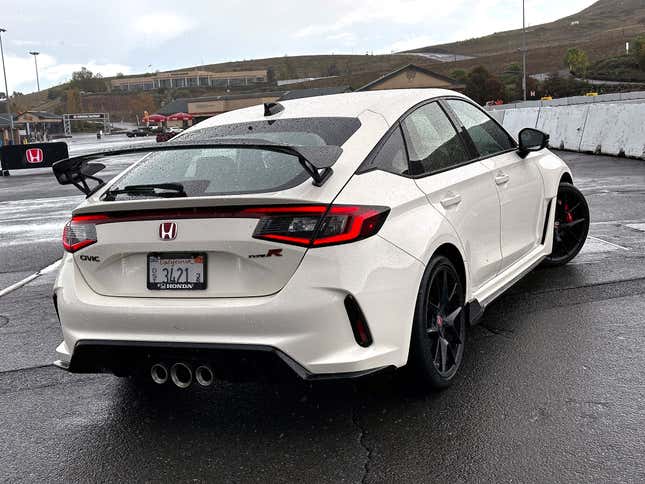
But that triple exhaust is the wildest I’ve seen on a modestly priced production car in some time, and the GT4-esque wing strikes the proper vibe. The whole package looks even better with the dealer-installed accessory forged wheels, which remind me of the classic Type R rims on the EP and FN Civics.
2023 Honda Civic Type R: What’s New?
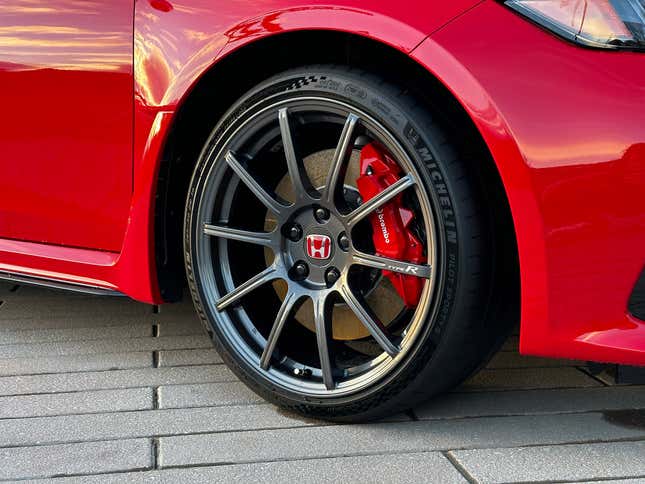
The changes run deep beneath the subtle new sheet metal, and the engine’s a good place to start. With 315 horsepower and 310 lb-ft of torque on tap, Honda has been proud to point out that this new Type R is the most powerful car it’s ever sold in the U.S. (In much of the world, that title goes to the 600-hp second-generation NSX, which wears a Honda badge outside the U.S.) I don’t know if that fact will impress enthusiasts the way the automaker thinks it will, but it’s a milestone all the same.
You can credit optimizations to the turbo and exhaust system for the 9-hp, 15-lb-ft increase to the K20C’s output — the same 2.0-liter mill from the last Type R. Cooling was a bugbear in the outgoing model, so the FL-generation Type R benefits from a grille that’s larger by nearly half, as well as a bigger radiator and fan.
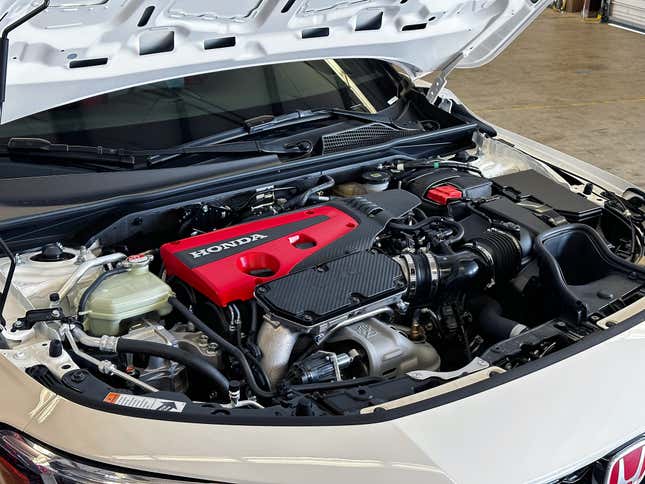
The move to the 11th-gen Civic floorplan means a longer wheelbase by 1.4 inches. That alone helps stability, but of course the Type R gets special treatment. Honda says it’s boosted rear torsional rigidity 15 percent over last year’s model, and widened the track by a full inch in the front and three-quarters in the rear. Engineers dialed more initial negative camber and caster into the Type R’s renowned torque-steer-neutralizing dual-axis front suspension in the pursuit of sharper turn-in.
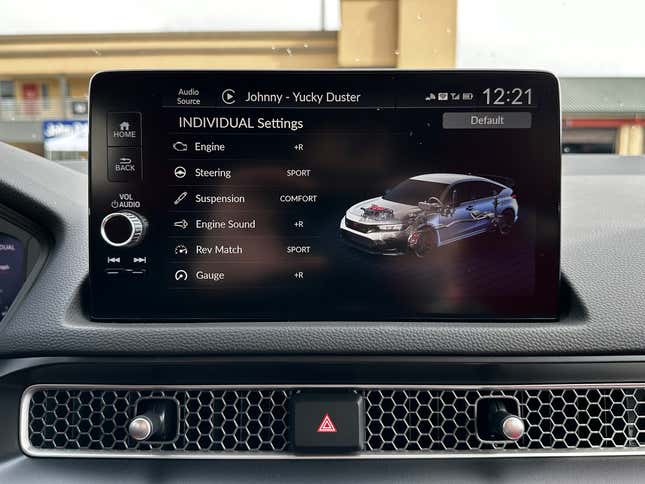
Electric power steering and adaptive dampers work in concert to deliver three decidedly unique driving modes: Comfort, Sport and R+. You’re also free to mix-and-match ride, steering, throttle and sound characteristics via a new, customizable Individual mode, which is the real star of the show. Don’t count on a sonorous exhaust note, though. Even with that aggressive-looking triple-tip setup and the first active-valve muffler system ever fitted to a Type R, the turbo four-cylinder makes a subdued sound.
2023 Civic Type R: How Does it Drive?
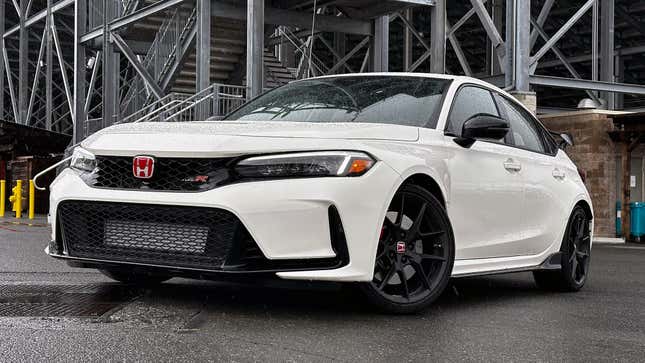
Northern California is home to some of the country’s finest driving roads — exactly the kind you want to tackle in a Type R. Ink has already been spilled on the new hot Civic’s track prowess, and I’ll share my experience there as well. But first, let’s talk about composure on the street.
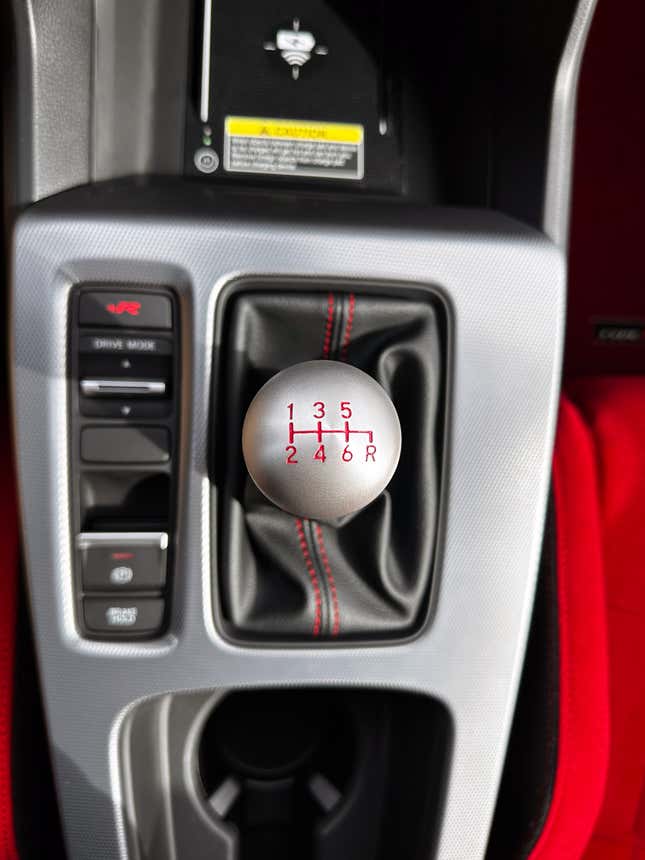
The Type R is a very easy car to enjoy, and that accessibility is best exemplified by the transmission. The six-speed manual in this car is the most forgiving I’ve ever driven, and frankly, the best in the performance hatchback category. Every aspect of the gearbox is pretty much perfect: The classic Type R milled metal shift knob; the heft and consistency of every throw, smooth yet imbued with all the tactile feedback you want; the agreeability of the clutch and the responsiveness of the automatic rev-matching. Heel-toe aficionados need not fear — that last feature can be turned off. The clutch action never fools you into thinking you need more throttle than is necessary. You have to deliberately go out of your way to get a jerky start in the Type R. That’s not true of Toyota’s GR Corolla, and that’s also not the last time the Corolla will come up in this review.
The steering is tight, immediate and direct. Sport mode helped by firming up the steering assist and the suspension dampers, but on choppier mountain asphalt, I was grateful for Comfort mode’s more compliant ride. The Type R will make an excellent daily driver, no doubt about it.
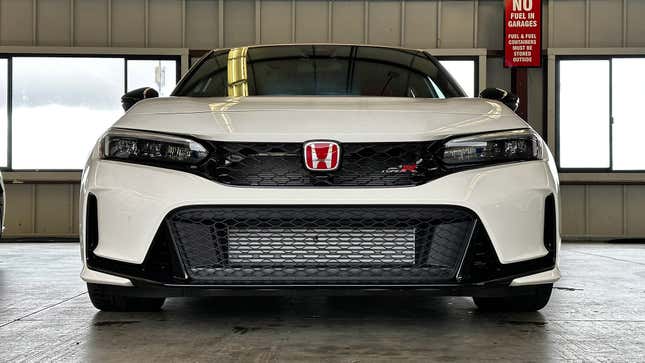
A track presents different considerations, and the Type R excels there too. But there was a wrinkle in my first visit to Sonoma Raceway: Rain was very much in the forecast.
Nothing — not even my years of dominance in Gran Turismo 4 back when the circuit was called Infineon — could prepare me for the ass-clenching challenge of lapping this roller coaster of a course, in the wet, in a high-powered front-wheel-drive car. Our pro guide for the day was Honda factory driver Ryan Eversley, who steered an FK8 Type R to a TCR-class championship during the 2018 Pirelli World Challenge season. He recommended we remain in the softest Comfort mode for the most grip in the poor weather.
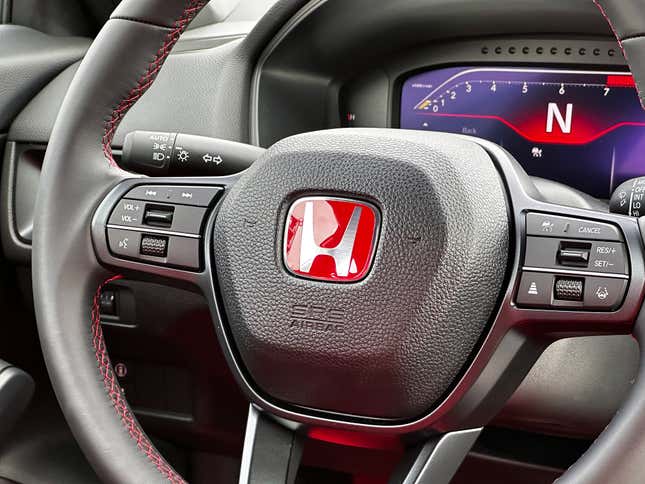
You have to approach a car like the Civic Type R delicately in these conditions. The front-drive nature of the car accelerates that old axiom of the performance driving “string theory”: Imagine a string connecting the steering wheel to the accelerator pedal. If you’re turning the wheel, you have to ease off the gas; if you want to accelerate, you have to straighten the wheel. The combination of cold tires and a slick surface sent me skittering on the Type R’s stock Pilot Sport 4 rubber as I tried to tiptoe over Turn 2 on the sighting lap. “Oh, it’s going to be like that,” I said to myself.
Over the next few laps, I learned where to be especially judicious with the throttle. Turn 5 — the long, high-speed right-hander before the long descending left-hand carousel — proved surprisingly tricky. It looks like an easy bend, but I needed a few tours through it to realize I’d been asking the tires to do too much. Once I eased off the throttle almost completely, it became manageable.
As the track dried into the afternoon, I could build a little speed. (Except in that pesky Turn 5, which is located behind an embankment in a shadow and never fully dried.) The Type R ate up the back-half esses with barely any body roll, while in low-speed corners the car displayed a complete devotion to razor-sharp turn-in, something Steve mentioned in his track drive. This is a playful car, eager to rotate. And even though I was lapping predominantly in Comfort mode, the traction control didn’t really step in until I’d made a fool out of myself and needed it to pull me back.
2023 Civic Type R: How’s the Interior?
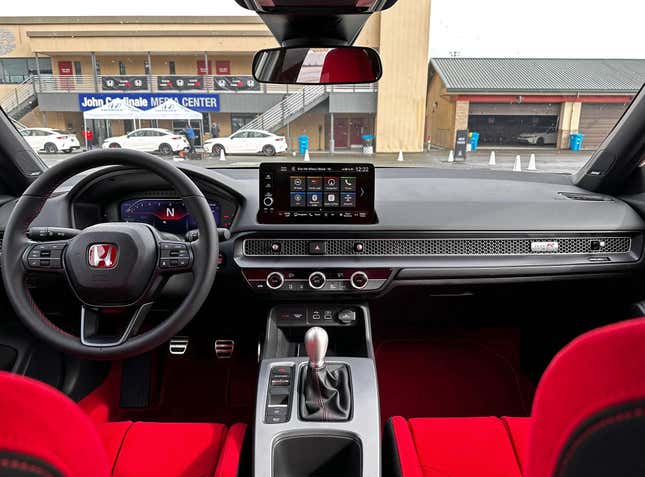
There are plenty of reasons you’d want a new Civic Type R in your life, but you may be surprised to learn one of the biggest is the interior. The cabin is so good — for the driver and front passenger, anyway — it sets the benchmark for every car in this class.
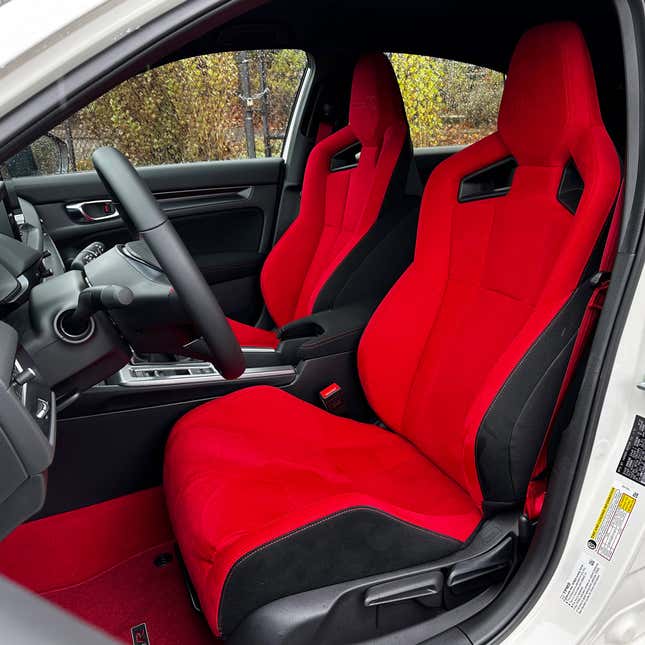
It’s a thoroughly delightful place to spend a few hours, but then, so is an ordinary 11th-gen Civic. However, that car wouldn’t have the Type R’s stunning red seats and carpet, or the aforementioned shifter — an object of art all to itself. The seats are snug but not stifling, and far more comfortable than their competition-inspired shape might imply. My only gripe is that you can’t option heated or power-operated front seats, which is pretty unforgivable for a car in this class. It’s hard to stay mad at those seats, though, looking as phenomenal as they do.
Continuing the design plaudits, I love the honeycomb grate spanning the width of the dashboard, the iconic red badge on the steering wheel and the general airiness of the cabin. The A-pillars are thinner, which really makes it easier to see out of the car, and even makes it feel more nimble as you aim toward an apex. Honda’s Android-based infotainment system isn’t impressive to look at, but it is reasonably laid out and strikes a good middle ground between Toyota’s to-a-fault minimalism and Volkswagen’s labyrinthine, inscrutable menus. You get plenty of physical buttons and knobs, too, which is always a win.
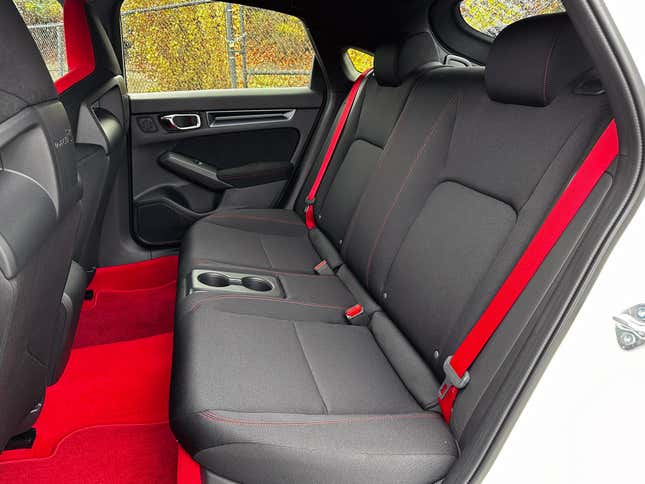
The rear seat in a car like this tends to be a target for cost-cutting, and we have to acknowledge that factor in the Type R, where the rear accommodations are about as basic as they come. Even my Ford Fiesta ST, which cost about $20,000 less (in 2017 money, anyway) had partial leather on all the seats. The Type R gives you what is essentially a bargain Civic cloth bench, with a hint of red stitching and red seatbelts. And because the cupholders live permanently between the rear seats — rather than in a stow-away armrest — you can’t even stuff a fifth passenger in there. Honda could do better.
2023 Honda Civic Type R: Competition and Final Thoughts
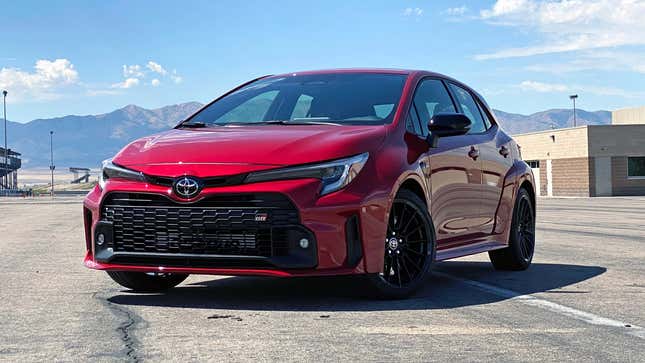
Although I missed my chance to drive the last Type R, recently I’ve been fortunate enough to sample what I’d consider to be Honda’s two foremost competitors here: the Toyota GR Corolla and the Volkswagen Golf R.
In some ways, you can view the Type R as the midpoint between both cars. It’s not as affordable as the cheapest $36,995 GR Corolla, and even a well-optioned Core model with limited-slip diffs can be had for less than the Honda. On the other hand, the Type R is just over $1,000 less than the $45,185 Golf R. That market position makes sense, with the Type R being more comfortable than the Corolla (owing to Honda’s adaptive dampers) but less luxurious and teched-out than the Volkswagen (though that has its benefits).
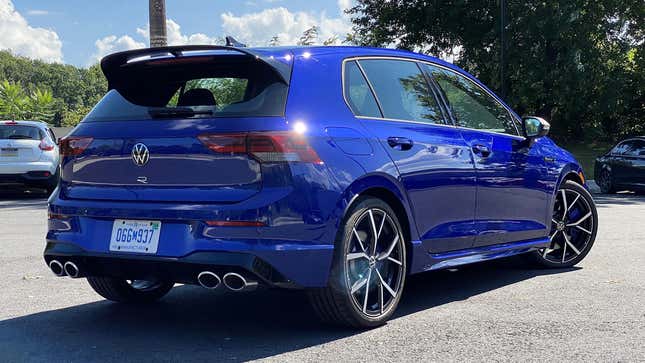
And then there’s that little issue of how each car motivates itself. Compared with the all-wheel-drive GR Corolla and Golf R, the Type R is the lightest of the trio at 3,188 pounds. That figures to be a massive advantage over the 3,481-pound Volkswagen, but undercuts the Core-spec Toyota by just 64 pounds. The Civic’s 315 hp matches the Golf and beats the 300-hp Corolla; Honda also claims a clear torque advantage too, besting VW by 15 lb-ft (if we’re comparing to the DSG-equipped Golf R) and Toyota by 37 lb-ft.
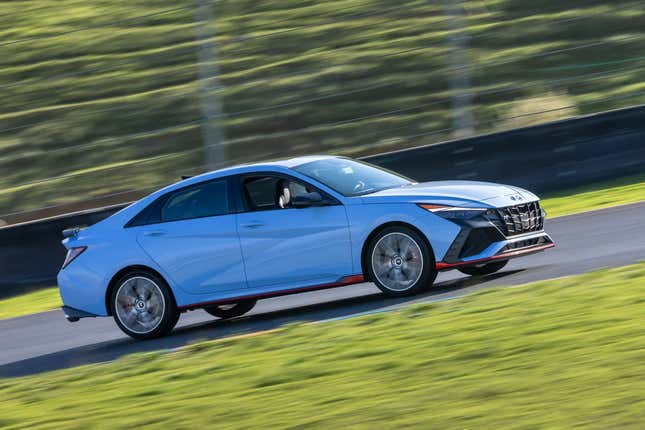
So the Civic Type R is the lightest and most powerful car in its class. But all-wheel drive’s advantages are hard to ignore. And as long as we’re talking about the front-wheel-drive camp, we have to acknowledge the gnarled mug of the Hyundai Elantra N, picking up right where the old FK8 left off. At $33,245, it’s almost $11,000 cheaper than the Type R, but forces you to settle for just 276 hp and 289 lb-ft of torque. I’ve never driven the Elantra N, and on paper it’s the less compelling of the pair. But is it five figures worse? That’s a question you’ll have to answer for yourself.
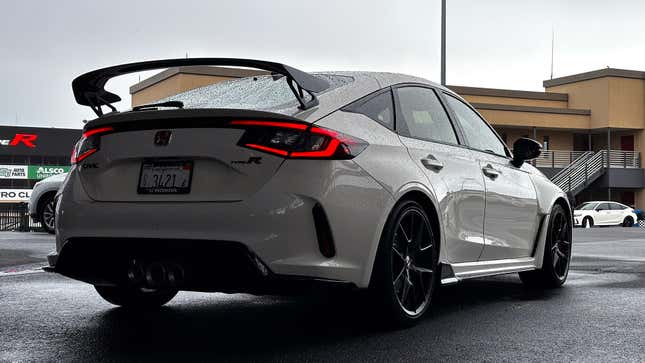
Each of these cars shines in its own right, prioritizing different aspects of the performance compact experience. That doesn’t diminish the Civic Type R’s brilliance. This is a deserving addition to a long line of fast Honda hatches, with plenty of improvements and a refreshing new face. That’s all we ever needed it to be: Proof that the Civic Type R formula continues to work.